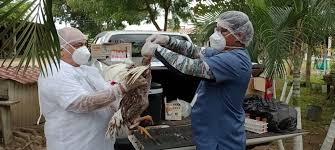The spread of the H5N1 virus and the urgency of prompt action
Concerns about a new pandemic and the effectiveness of the wargaming methodology
GEOPOLITICSWARGAMING


The spread of the H5N1 virus and the importance of acting swiftly
The spread of the H5N1 virus, commonly known as bird flu, has raised increasing concerns over the last three years. This virus has impacted mammals of diverse species globally, posing a significant challenge to public health. Being highly pathogenic, it can result in severe illness and fatalities in both animals and humans. Birds are the primary carriers of the virus, but transmission to humans is also possible through contact with infected animals. While human-to-human spread is uncommon, the potential for a new pandemic is cause for alarm.
Risks of a new pandemic
The USA is currently deeply concerned about the swift progression of events, highlighted in a New York Times article titled "Bird Flu Is Infecting More Mammals. What Does That Mean for Us?" available at https://www.nytimes.com/2024/04/22/health/birdflu-marine-mammals.html#:~:text=Bird%20Flu%20Is%20Infecting%20More%20Mammals.%20What%20Does%20That%20Mean%20for%20Us%3F. A potential new bird flu pandemic could have severe repercussions on public health and the global economy. The rapid spread of the virus, coupled with the human population's lack of immunity, might result in a significant increase in cases and fatalities.
The importance of taking proactive steps
Faced with these challenges, it is essential to act promptly to prevent another pandemic or reduce its potential impact. Health authorities should enforce control and prevention measures, including monitoring migratory birds, early detection of cases in animals, and vaccinating animals in high-risk regions.
Moreover, it is crucial to raise public awareness about the dangers linked to the H5N1 virus and the steps that can be taken to minimize transmission. This involves practicing good hygiene like washing hands, covering the mouth when coughing or sneezing, and avoiding contact with sick animals.
International cooperation is essential in the fight against the virus. Nations should exchange information and resources, work together on vaccine and treatment research, and coordinate responses for a quick and efficient reaction to outbreaks.
Wargames in a pandemic context
As previously featured on our blog, the Tito Geopolitics Blog, predecessor of "T&P Analyses," had already deemed the issue significant and incorporated it into the curriculum in 2023 as a subject for one of the Advanced Courses on Wargames. Consequently, the students in that class created the Global Storm Wargame, which was specifically focused on the potential outbreak of a bird flu pandemic. This simulation was subsequently presented to the Brazilian Ministry of Health for evaluation of its key findings.
The wargaming methodology is another tool that can aid in preparing for complex issues like a pandemic. It enables visualizing gaps, highlighting the necessity of collaboration among different stakeholders, and uncovering new information. Moreover, these insights can be gained prior to the actual outbreak, making response efforts more effective.
Initiatives like this, particularly when taken proactively, enable improved readiness and understanding of a problem that, besides being intricate, can escalate rapidly, imposing significant stress on decision-makers and potentially resulting in compromised quality or errors in vital decisions. Through such proactive measures, we can prevent another pandemic or mitigate its consequences. The health and welfare of our community rely on our capacity to respond promptly and efficiently.
Fig. 7545-combating-avian-flu-government-performs-second-stage-of-serology-in-birds-of-roraima
